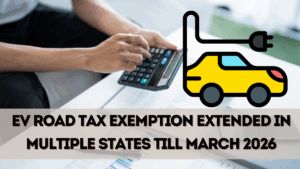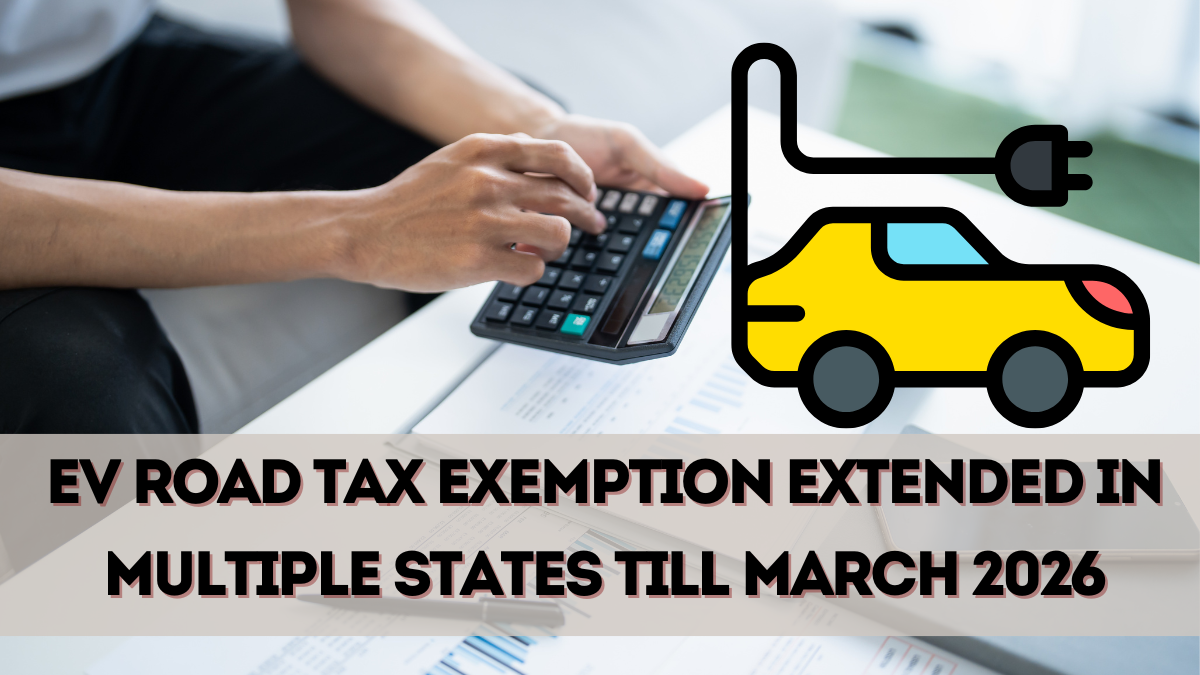The push for green mobility in India has received another boost as several state governments have announced an extension of road tax exemptions for electric vehicles (EVs) until March 2026.
This move is expected to make EV ownership more affordable while supporting the government’s long-term goals of reducing carbon emissions and promoting clean transportation.

Why Road Tax Exemption Matters
Road tax is a one-time payment that buyers make when registering a new vehicle. For EVs, this cost often ranges between 5% and 10% of the vehicle’s value.
By exempting EVs from this tax, state governments are significantly lowering the initial purchase cost, which remains one of the biggest barriers to EV adoption in India.
This policy directly benefits both personal car buyers and fleet operators looking to transition to electric mobility.
States Extending the Exemption
Several states have confirmed the continuation of the road tax exemption for EVs.
-
Delhi: Extends full waiver till March 2026 under its EV Policy.
-
Maharashtra: Offers 100% road tax exemption alongside registration fee waivers.
-
Karnataka: Continues exemption to promote EV use in Bengaluru.
-
Tamil Nadu: Supports EV adoption with road tax waivers and charging infrastructure investments.
-
Uttar Pradesh: Extends benefits to encourage EV manufacturing and sales in the state.
Other states are expected to announce similar extensions soon, ensuring wider coverage across India.
Benefits for EV Buyers
The exemption reduces the total cost of ownership, making EVs far more appealing.
For example:
-
A car priced at ₹15 lakh could save ₹75,000–₹1.5 lakh in taxes depending on state rates.
-
Two-wheeler buyers could save ₹10,000–₹20,000 upfront.
Combined with subsidies under the FAME-3 scheme, these savings make EVs more competitive against petrol and diesel vehicles.
Positive Impact on Sales
The extension is expected to boost EV sales significantly in 2025 and 2026.
-
Private Buyers: Families looking for affordable alternatives will be drawn by reduced costs.
-
Commercial Fleets: Taxi operators and delivery companies will expand EV fleets due to lower upfront costs.
-
Two-Wheeler Segment: Students and daily commuters will benefit from cheaper e-scooters and bikes.
Analysts predict a 25–30% rise in EV registrations in states offering tax exemptions.
Government’s Green Mobility Goals
The road tax exemption aligns with India’s broader EV adoption targets.
The central government aims for 30% EV penetration by 2030 across all vehicle categories. Extending tax benefits helps states contribute to this national goal.
It also supports India’s commitment to reduce carbon emissions under global climate agreements.
Challenges in Implementation
While the policy is widely welcomed, a few challenges remain.
-
Revenue Loss: States lose tax revenue, which may impact budgets.
-
Uneven Adoption: Not all states offer the same benefits, leading to regional gaps.
-
Awareness Issues: Many buyers are still unaware of available exemptions.
To counter these, governments are planning awareness campaigns and working with dealerships to ensure buyers know about the savings.
Industry Response
EV manufacturers have praised the decision, calling it a big boost for the industry.
Brands like Tata Motors, Mahindra, and Ola Electric expect higher sales volumes as buyers take advantage of lower costs.
Industry bodies have also requested the government to consider extending GST benefits and insurance incentives for EVs to complement the tax exemption.
Long-Term Outlook
The extension till March 2026 shows that India is serious about supporting EV adoption.
Experts believe that even after 2026, governments may continue with partial exemptions or shift to differential taxation, where EVs pay significantly lower taxes compared to fossil-fuel vehicles.
This long-term support will provide stability for manufacturers and confidence for buyers, ensuring steady growth of India’s EV market.
FAQs
What is the road tax exemption for EVs?
It is a policy where EV buyers are not required to pay state road tax during registration, reducing the overall cost of purchase.
Until when is the exemption valid?
Several states have extended the exemption till March 2026.
Which states are offering this benefit?
Delhi, Maharashtra, Karnataka, Tamil Nadu, and Uttar Pradesh are among the key states extending exemptions.
How much can buyers save?
Savings range from ₹10,000 for two-wheelers to over ₹1.5 lakh for cars, depending on state rates.
Will this policy boost EV adoption?
Yes. Lower upfront costs combined with subsidies are expected to drive a significant rise in EV sales in 2025–26.
Click here to know more.
